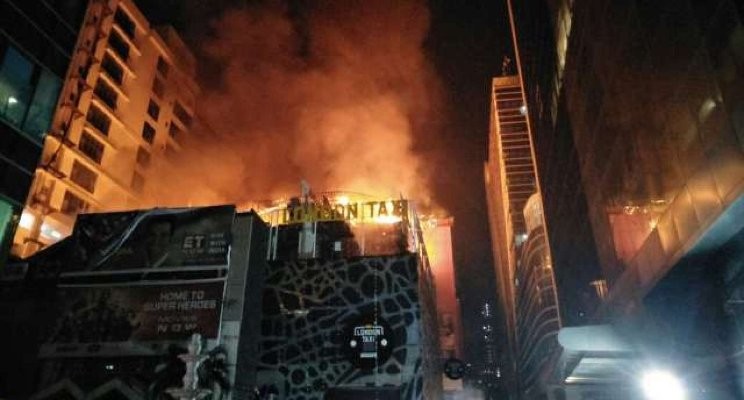
–By Sumeet Mhaskar, Associate Professor, Jindal School of Govt & Public Policy
When at least 17 people were killed after a fire broke out at a firecracker factory in outer Delhi’s Bawana industrial area, no major outrage followed it, no heads rolled.
The recent fire at the Above1 pub located in the Kamala Mills compound took life of 15 youths. Most of the deceased youths, who had come to celebrate the birthday of their friend, belonged to well-to-do Gujarati-Marwari families. Given their socio-economic status, the state machinery as well as the political class responded immediately to the tragedy. The Prime Minister, the Maharashtra State Chief Minister and the President early in morning tweeted their condolence messages. Municipal authorities suspended several officials for callousness towards their duty, and within 24 hours, municipal officials took action on nearly 350 restaurants and pubs for violating various regulations.
However, in a similar incident at least 17 people were killed after a fire broke out at a firecracker factory in outer Delhi’s Bawana industrial area on Saturday evening. No major outrage followed it, no heads rolled. In fact, the north Delhi mayor was caught on camera instructing her fellow politicians to not speak anything against the factory because they had issued the licence to the factory.
If you go a further back in date, fire at the Bhanu Farsan, a snack factory-cum-shop in Mumbai received little attention. About twelve North Indian migrant workers suffocated to death due to smoke inhalation while they were asleep when fire broke out at the Bhanu Farsan. No higher-level people’s representative expressed their condolences to the victims’ families as if their life had no values. Even the ‘torchbearers’ of the Marathi manoos, who are otherwise vocal on migrants stealing away the jobs of the locals, kept silent.
In Bhanu Farsan incident, the police arrested the owner of the enterprise, however, no suspension of municipal officials took place and neither was large scale action take on similar illegal establishments. It is not surprising that the socio-economic location of the victims in the Above1 pub forced the state and the political class to respond to the incident. Both the fire incidents are a result of the violation of various municipal regulations by the enterprise owners. This flouting of regulations, which is widespread, has been the case historically whereby the ruling political class together with the state officials work in collusion with the enterprise owners.
The three cases discussed here have certain similarities. The most crucial one is the non-compliance of safety regulations by the enterprise owners. As the grandfather of the 28-year-old victim very rightly said, “this restaurant had no fire extinguisher, no equipment to put out fires, no proper outlets.” Moreover, while the enterprise owners were allocated only one-third space officially, they occupied two-third extra space illegally. In the past, there have been some actions by the municipal officials on the illegal use of the space. However, the connivance of the municipal officials with the shop owners meant that their license to run the shops remained untouched. The Kamala Mills owners, following the closure of textile mill about a decade ago, have been offering its space to corporate offices and restaurants at cheaper rates because it lacked adequate infrastructure.
A few years ago, part of the Kamala Mills premises occupied by one of the corporate offices experienced the falling of the ceiling but thankfully, no one was hurt. Bypassing the regulations and the state authorities turning a blind eye towards it is not new to the textile mills.
The Murder of Mills report by Shekhar Krishnan documented about two decades ago as to how the Phoenix Mills sought permission for creating an entertainment space for the mill workers but instead constructed an expensive bowling alley. Again, the state authorities did not take any action against the Phoenix Mill owners. In fact, in many textile premises the construction of high-end entertainment spaces has been done in total violation of the regulations.
The Bhanu Farsan and Bhawana are representatives of the small-scale enterprises that constantly defy state regulations. Bhanu Farsan owner did not have the permission to employ more than five workers and to carry out the production of snack. However, nearly 15-20 workers were employed in the shop. Similar establishments exists all over Mumbai city, especially in the slum areas, where migrant workers work in cramped spaces with abysmal working conditions and for ridiculously low wages and longer working hours. My ongoing research on the single male migrant workers show that almost all the establishments that operate in slum areas lack basic toilet and water facilities, which subsequently has health implications for the workers.
The everyday functioning of such establishments is contingent upon the bribes provided to the police, the municipal authorities and the ruling political class. The Shiv Sena-BJP who have been ruling the Mumbai’s civic body for several decades have not taken any step in improving the conditions of those who work in such situations. Both these incidences discussed here are not exceptional in any way and the chances of such instances happening in future cannot be entirely ruled out. These incidences also demonstrate that the political class governing the city has no concern for the lives of its residents and those migrant labourers who keep its economy going. Mumbai city has a long way to go in providing minimum safety measures for everyone. Unless the local and regional state dramatically changes its approach and ensures that enterprise owners follow the regulations, Mumbai’s transformation into a world-class city or as the current NDA government would like to call it a smart city, will be far from reality.
(The article was originally published in Outlook)


